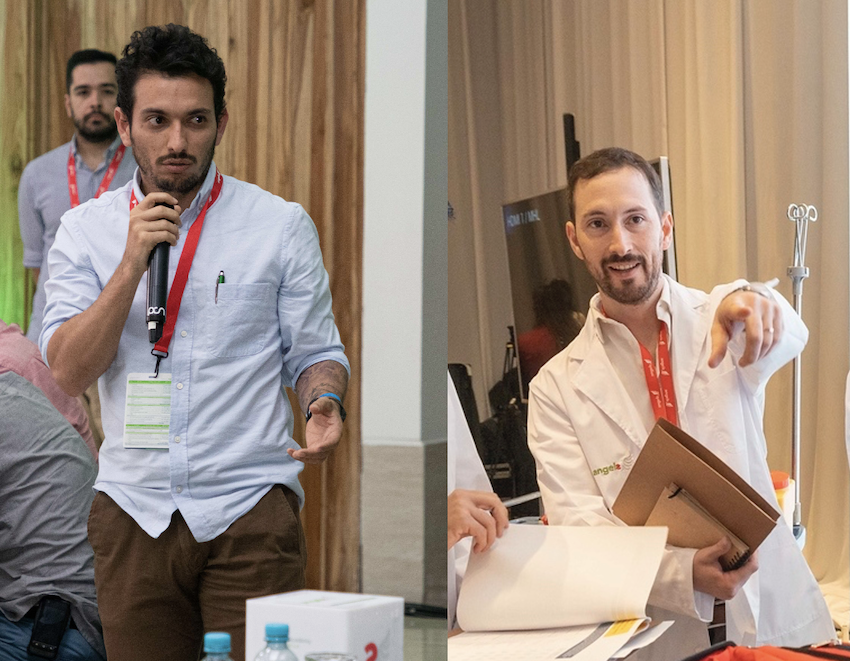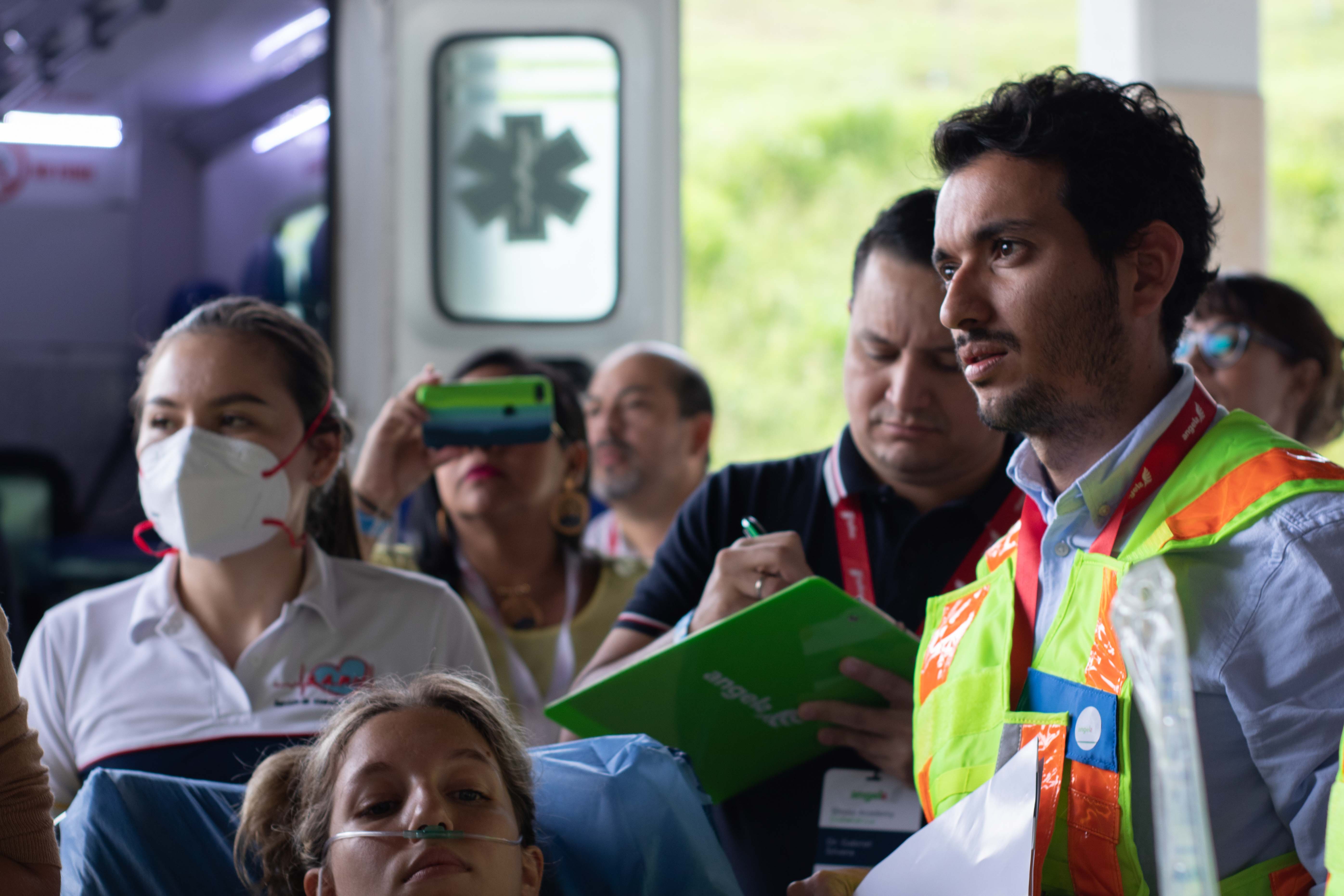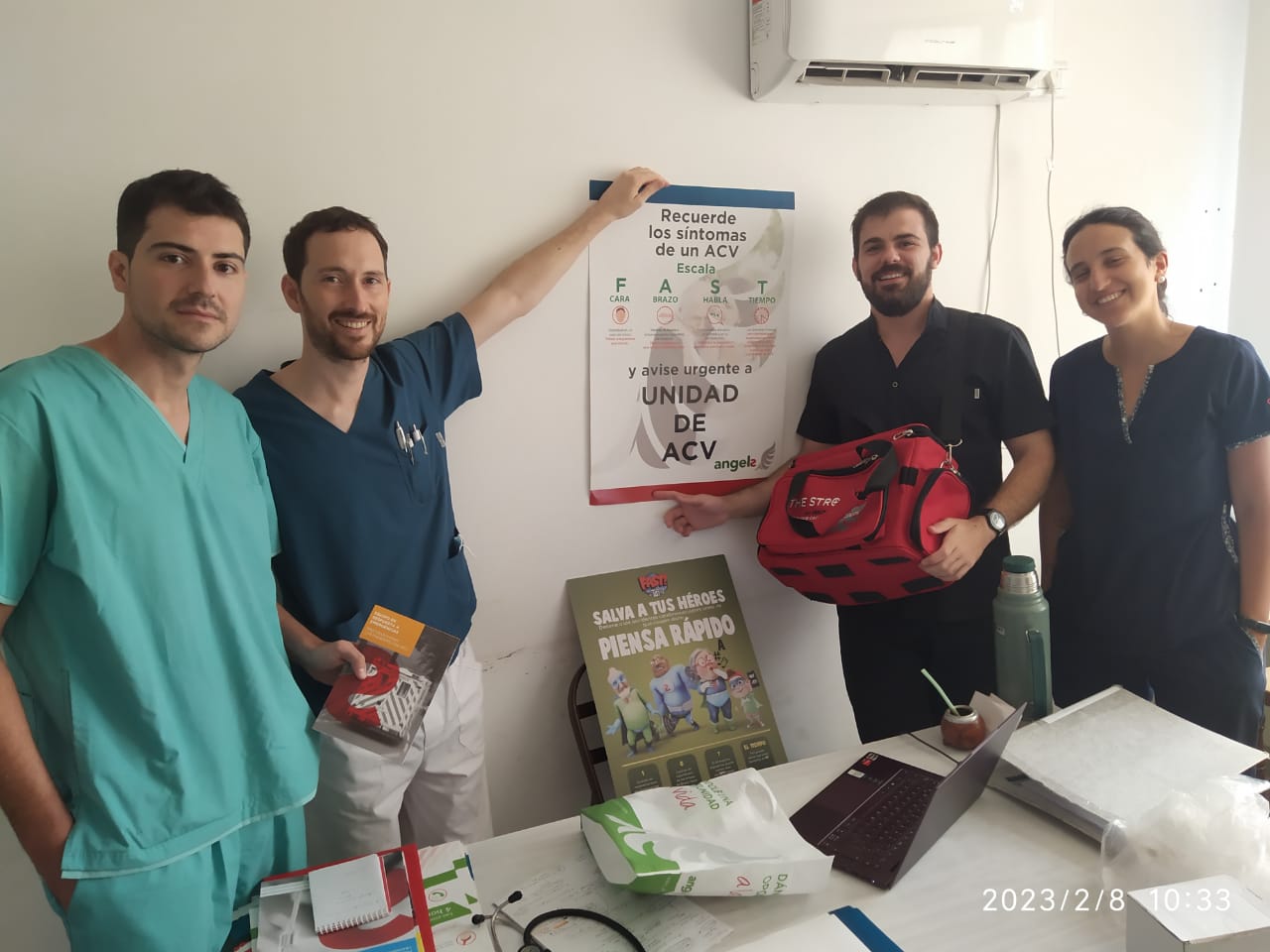
MENTOR, mówi Oprah Winfrey, to "kogoś, kto pozwoli Ci zobaczyć nadzieję w sobie". Nadzieja była jedną z pierwszych rzeczy, które uderzyły dr Claudio Jiménez, neurolog w szpitalu Simón Bolívar w Bogotá w Kolumbii, kiedy spotkał się z młodym lekarzem argentyńskim, dr Ignacio Girolimini. Bezpośrednio po zauważeniu silnego podobieństwa do Lionel Messi.
"Ignacio miał wolę, a jego nadzieja była oczywista" - mówi.
Dwóch lekarzy spotkało się w ramach programu mentoringu ROPU w Ameryce Południowej, który jest zarządzany przez Deborah Ferreras, Kierownik Zespołu Angels w Ameryce Południowej oraz kierownika medycznego ds. układu sercowo-naczyniowego Alejandro Lakowsky.
Dr Girolimini chciał poprawić leczenie udaru w swoim małym mieście. Dr Jiménez, który zmienił leczenie udaru w swoim własnym szpitalu w Bogocie, został mianowany mentorem. W innym miejscu tego problemu możesz przeczytać więcej o obu tych lekarzach. Oto, w jaki sposób ten mentoring rozwinął się, własnymi słowami.

Dr Claudio Jiménez:
Uważam, że cała praca, którą wykonaliśmy w naszej instytucji, i doświadczenie, jakie udało nam się osiągnąć, osiągając rzeczywistą wartość, gdy jest ona udostępniana. Dlaczego więc warto wziąć udział w programie mentoringu, którego celem jest pomoc w budowaniu ośrodków i sieci leczenia udar w Ameryce Łacińskiej? Powodem jest nie tylko to, że są one potrzebne lub że medycyna jest powszechną rzeczą dla ludzkości, ale też, że dzielenie się pomyślnymi doświadczeniami poza wąskimi granicami "nas" i "my".
Kiedy poznałem Ignacio, najpierw myślałem: "Ale on wygląda jak Messi!" Następnym pomyślałem, że to samo dla nas wszystkich, którzy nie muszą rozpoczynać od niczego i chcą zmienić procesy opieki nad osobami cierpiącymi na udar mózgu. Na początku budowania naszego zespołu miałam takie same wątpliwości, a na koniec nasze centrum leczenia udarów. Rozpoczęliśmy więc dialog, który rozpoczął się od tego, co dla mnie stanowi przesłankę do tego typu przedsięwzięcia:
"Ignacio powie Ci tysiąc razy, że plan nie jest wykonalny. Musisz wierzyć w to, że możesz, dopóki nie osiągniesz tego, ponieważ to osiągniesz”.
A dzięki temu wyrażeniu paniki z ogromnym nadzieją powiedział: "Pójdziemy do pracy, mamy już tomograf!"
Widziałem, że człowiek jest skłonny poświęcać czas na to, co definiuje jako "krytyczny moment naszego istnienia".
Dr Sheila Martins zawsze mówi, że "chęć i tomograf" są jedynie niezbędne do leczenia udar mózgu. Ignacio miał wolę, a jego nadzieja była oczywista. Zdecydowanie sądzę, że są to dwie rzeczy, które nas poruszają. Tam, gdzie mamy zamiar i nadzieję, że dysponujemy podstawowymi narzędziami do osiągnięcia sukcesu. Następnie uczymy się tolerować porażki i przezwyciężać opór. Firma Ignacio posiadała te podstawowe i niezbędne cechy.
Coś innego, co jest bardzo ważne, a Ignacio robi z bezwzględną naturalnością, jest to, że praca lidera jest kluczowa, ale ta sztuczka ma być przykładem. Mówią, że kiedy jesteś dobrym liderem, ludzie nie realizują poleceń, postępują zgodnie z nimi. Firma Ignacio jest zawsze pierwszą osobą, która weźmie udział w sprawie, jest zawsze gotowa odpowiedzieć na telefon w celu uzyskania kodu udar, a to przenika całą grupę – chęć zrobienia tego samego i niestrudzenie pracować, aby pomóc pacjent.
Wyzwania związane z udar mózgu są uniwersalne. Zawsze zaczyna się od jednej lub dwóch osób, które chcą wdrożyć protokół opieki. Następnie istnieją ograniczenia technologiczne, które na szczęście w przypadku Ignacio zostały rozwiązane poprzez oddanie skanera TK do szpitala.
Podawanie leków pacjentom z ostrym udar niedokrwienny mózgu ma jedną rzecz. Kolejną rzeczą jest zbieranie danych, zarządzanie nimi, analizowanie ich i wykorzystywanie ich w celu rozwoju zespołu. Aby jeden lekarz wykonał prace kliniczne, a następnie musiał wczytać dane do tabel Excel w nocy lub w bezpłatne weekendy, to jest bariera. Firma Ignacio ponownie przejęła tę pracę, ale w miarę jak populacja uczy się rozpoznawać system udar i zwiększa się objętość pacjent, co może stać się nie do utrzymania.
Następnie istnieją wszystkie ograniczenia systemów opieka zdrowotna w naszych regionach – niezależnie od tego, czy pacjent ma ubezpieczenie społeczne, czy też przyjeżdża do szpitala, który nie może ich leczyć, a następnie musi zostać przeniesiony do ośrodka, w którym wykonywana jest tomografia. Dlatego spędzamy czas na rozmowach o udar. Sieci są jedynym sposobem na wyeliminowanie okropnej bariery dostępu do terapii reperfuzyjnych w ostry udar mózgu mózgu.
Program mentoringu Angels to coś więcej niż wspaniała inicjatywa – jest to globalna potrzeba. Bardzo ważne jest, aby doświadczenia lekarzy były udostępniane poza badaniami w czasopismach medycznych, które są oczywiście kluczowe dla rozwoju naszej nauki. Musimy jednak inwestować w przekazywanie naszych doświadczeń bezpośrednio osobom i grupom ludzi, które tego potrzebują, zwłaszcza społecznościom mającym trudny dostęp do zasobów.
Przez całe życie zawodowe miałem mentorów, od studiów licencjackich po moje szkolenie jako neurolog i neurofizjologa. Ale jeśli muszę wymienić kogoś, kto pomógł mi w rozwijaniu moich umiejętności i znaleźć narzędzia, które posiadam, to to niewątpliwie dr Liselotte Menke Barea, neurolog w Porto Alegre w Brazylii. Była kierowniczką służby, kiedy tam szkoliłam, a jej osobowość, jej dyscyplina i delikatność w radzeniu sobie z pacjentami całkowicie zmieniły mój sposób praktykowania medycyny.

dr Ignacio Girolimini
Co motywowało Cię do ubiegania się o ten program mentoringu; co masz nadzieję osiągnąć?
W pierwszej kolejności znaleźliśmy się bez jasnych wytycznych dotyczących dalszego postępowania, sposobów jednoczenia wysiłków i dawania kolejności wielu zadań, które musieliśmy wykonać. Dr Carlos Ruffini, lekarz zespół ratownictwa medycznego (ZRM) ratunkowego, zasugerował, abym zaprezentował nasz projekt w ramach programu mentoringu.
Mamy nadzieję, że otrzymamy przewodnik i pomoc w zorganizowaniu i konsolidacji projektu utworzenia oddział lecznia udarów w naszym szpitalu.
Co wiesz o dr Jiménez przed rozpoczęciem współpracy?
Przed naszą wspólną pracą nie znałem dr Jiméneza ani jego imponującej pracy w Bogocie.
Opisz swoje pierwsze spotkanie z dr Jiménezem i swoje początkowe wrażenia z jego strony.
Spotkanie z Claudio było wspaniałym doświadczeniem. Jest osobą z dużym zaangażowaniem, wiedzą, pasją, a przede wszystkim empatią dla swoich współpracowników w sytuacjach podobnych do jego.
Jakie cechy, które zaobserwowałeś u niego, sprawiają, że jest skutecznym mentorem?
Jego poświęcenie i zaangażowanie, zawsze z przekonaniem, że nasza rzeczywistość w Ameryce Łacińskiej może i powinna zostać zmieniona, oraz że możemy dążyć do zapewnienia kompleksowej i wysokiej jakości opieki naszym pacjentom z udar.
W jaki sposób jego mentoring wpłynął na przełom w leczenie udaru w Twoim szpitalu?
Jestem bardzo wdzięczny za wsparcie dr. Jiméneza w tworzeniu oddział lecznia udarów. Było bardzo pomocne, jeśli chodzi o konsolidację siebie jako zespołu, a nie tylko o tymczasową inicjatywę.
Jak postrzegasz wartość tego rodzaju programu i czy postrzegasz siebie jako przyszłego mentora młodszych lekarzy?
Tego rodzaju programy są przede wszystkim niezbędne do wspierania tych z nas, którzy są daleko od dużych miast lub ośrodków o wysokim stopniu złożoności. Jestem w pełni dostępny, aby oddać wszystko, co nam dali i będę zachwycony, dzieląc się swoimi doświadczeniami.



